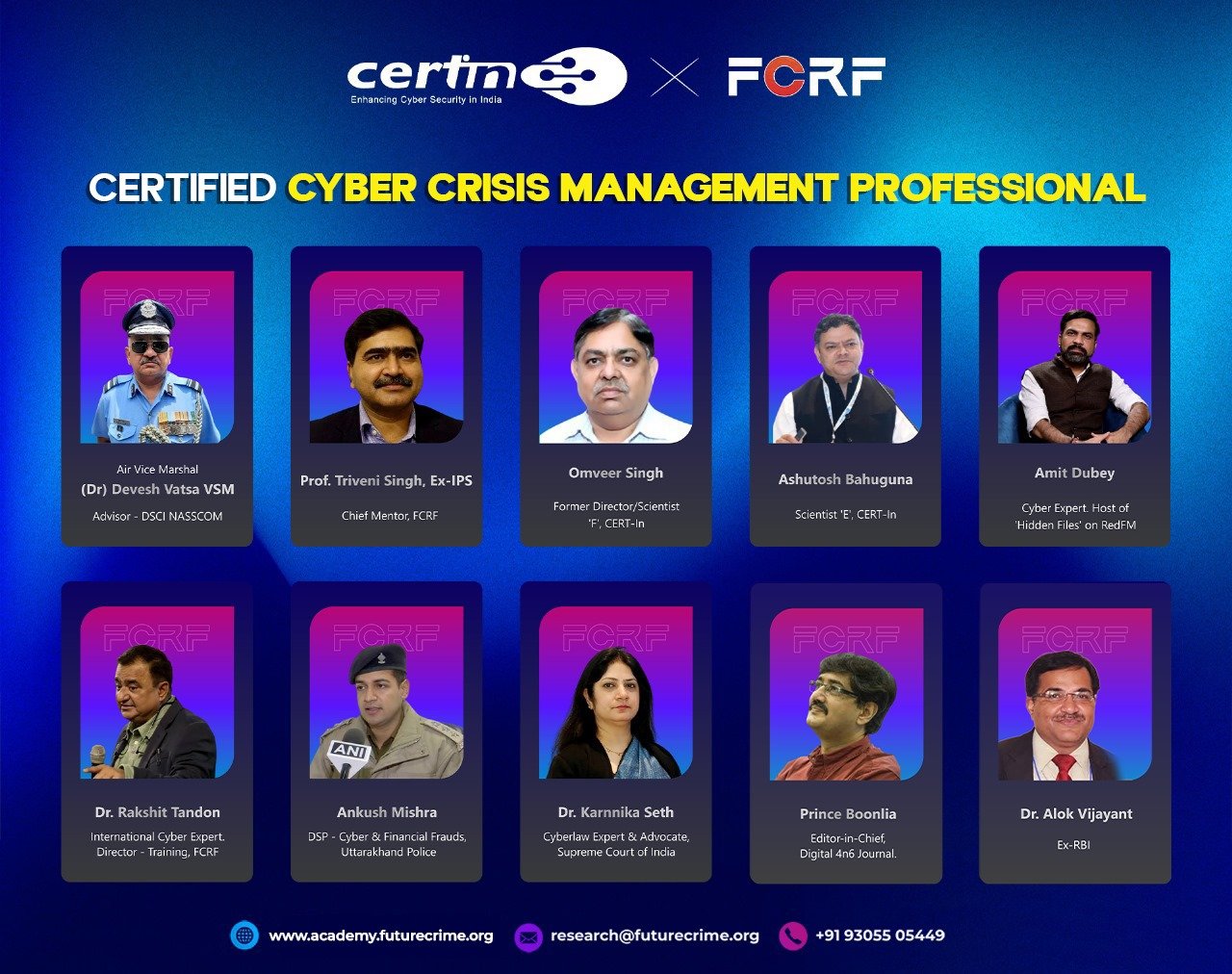Across sectors and geographies, regulators are making crisis preparedness a core component of cybersecurity compliance.
In India, the Reserve Bank of India (RBI) has made it mandatory for banks, NBFCs, and payment operators to conduct regular cyber drills, breach simulations, and tabletop exercises. These are not symbolic gestures—they test detection, containment, and recovery capacities under pressure.
SEBI’s Cybersecurity and Cyber Resilience Framework (CSCRF) 2024 requires annual vulnerability assessments and cyber drills for market intermediaries like brokers and mutual funds. The Insurance Regulatory and Development Authority of India (IRDAI) mandates BCP (Business Continuity Plan) and DR (Disaster Recovery) drills for insurers, reinforcing the need for CISO oversight and structured crisis plans.
FCRF x CERT-In Roll Out National Cyber Crisis Management Course to Prepare India’s Digital Defenders
CERT-In, while not explicitly mandating drills, promotes their use under the National Cyber Crisis Management Plan. And the National Critical Information Infrastructure Protection Centre (NCIIPC), under Section 70A of the IT Act, mandates crisis training and regular drills for institutions managing India’s Critical Information Infrastructure (CII)—including banking, telecom, and energy.
Global Consensus: From the U.S. to Europe, the Drill Mandate Grows Stronger
India’s regulatory direction is aligned with international best practices.
In the U.S., the National Institute of Standards and Technology (NIST) recommends frequent tabletop exercises across federal agencies and private entities, particularly in critical infrastructure sectors. Though non-binding, NIST’s framework is the foundation of U.S. cyber preparedness.
The European Union’s ENISA promotes cross-border cyber crisis exercises and simulations under the EU Cybersecurity Act. Its EU-CyCLONe initiative links CSIRTs (Computer Security Incident Response Teams) for large-scale joint response planning.
The UK’s Financial Conduct Authority (FCA) mandates scenario testing and crisis simulations under its Operational Resilience Framework. Similarly, Singapore’s Monetary Authority of Singapore (MAS) requires cyber drills and ransomware stress tests, while Australia’s APRA enforces incident response testing under its CPS 234 standard.
These regulations represent a global understanding: cyber crisis readiness is central to operational stability, national security, and investor trust.
What Is a Cyber Crisis Management Plan—and Why It Matters
A Cyber Crisis Management Plan (CCMP) is a living document that outlines an organization’s structured response to cyber incidents—from detection and containment to recovery and communication. Its importance lies not just in policy but in action.
In 2020, Mumbai faced a major power outage linked to a suspected China-based cyberattack on the grid. The incident triggered national debate about the readiness of Indian infrastructure. A robust CCMP could have helped contain the impact faster and provided structured communication to the public and stakeholders.
Key benefits of a CCMP include:
- Minimized Disruption: Ensures rapid containment and operational continuity
- Data Protection: Upholds privacy and security, in line with India’s Digital Personal Data Protection Act (DPDPA) 2023
- Regulatory Compliance: Avoids penalties like SEBI’s ₹20,000 per day fine for non-compliance
- Trust & Transparency: Demonstrates maturity and builds credibility with customers, regulators, and investors
A CCMP is not just a checklist—it’s a survival strategy.
Why Drills Matter: Practicing for the Worst Before It Happens
While CCMPs provide the strategy, cyber crisis drills provide the reality check. These simulations mirror real-world attacks—ransomware, phishing, DDoS—to test and improve an organization’s preparedness.
Cyber drills help organizations:
- Identify vulnerabilities in communication and escalation
- Test decision-making speed and team coordination
- Validate technical responses, such as log preservation or system shutdown
- Train new responders under pressure

RBI and CERT-In’s 2023 joint international conference emphasized this, noting that drills are now essential to build institutional cyber muscle memory.
Internationally, entities like ENISA and MAS emphasize multi-agency, cross-border drills to simulate coordinated response across jurisdictions—a scenario that’s increasingly common in globalized cybercrime.
The Skills Gap Challenge—and the Role of Targeted Training
Despite mandates, implementation lags due to a lack of trained personnel, budget constraints, and fragmented internal coordination. Many organizations have crisis plans on paper but no one trained to execute them.
Public-private collaboration and specialized training are the need of the hour.
That’s where the Certified Cyber Crisis Management Professional (CCMP) course comes in.
FCRF x CERT-In Launch CCMP Course: India’s First National Cyber Crisis Training Program
In response to this national and global need, the Future Crime Research Foundation (FCRF), an IIT Kanpur incubated nonprofit, in collaboration with CERT-In, has launched the Certified Cyber Crisis Management Professional (CCMP) course.
Click Here to Register Now
Starting July 5, 2025, the 4-week online course will run every Saturday and Sunday from 11 AM to 1 PM, hosted on the FCRF Academy LMS. The course is open to all—CISOs, BFSI professionals, InfoSec teams, cyber lawyers, IT officers, and even career switchers and students.
Course modules include:
- Cyber Crisis Planning & Leadership
- Advanced Persistent Threats (APT) & Targeted Attacks
- Digital Forensics & Evidence Handling
- ICS/SCADA Threats & Sectoral Simulations
- GRC, Audit Readiness, and Regulatory Drill Frameworks
- OSINT, Post-Breach Communication, and Mock Tabletop Exercises
Led by senior professionals from CERT-In, DSCI, law enforcement, and cyber forensics, the course provides not just certification but practical skill-building aligned with national and global compliance mandates.

A Call to Action: Resilience Through Readiness
The message is clear: Cyber threats are inevitable, but disaster isn’t. Regulators are setting the expectations. Organizations must now meet them—not just to comply, but to protect what matters.
Cyber crisis drills and CCMPs are the backbone of digital resilience. India’s growing digital economy, its exposure to cross-border threats, and the sensitivity of sectors like banking, energy, and health, demand more than reactive thinking.
Structured, simulation-based training like the CCMP course ensures that when—not if—a crisis occurs, someone is ready to lead.
Register for CCMP Today
The Certified Cyber Crisis Management Professional course begins 5th July 2025. Live sessions, hands-on labs, expert mentorship, and full online access included.
Visit: course.futurecrime.org
For queries: research@futurecrime.org | +91 93055 05449
Seats are limited. Cyber readiness starts with you.
Click Here to Register Now



